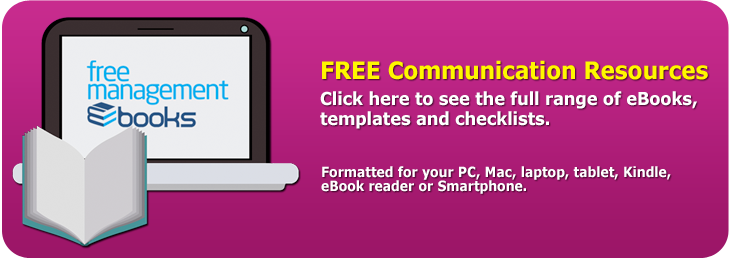Effective Communication in the Workplace
The ability to communicate is an essential life skill and one that can be continually developed. Even if you are a naturally good communicator, there are always opportunities and ways to enhance your communication skills.
Individuals who are good communicators find it easy to develop empathy and trust with others. These people adapt their style of communication to suit the audience and situation they are presented with.
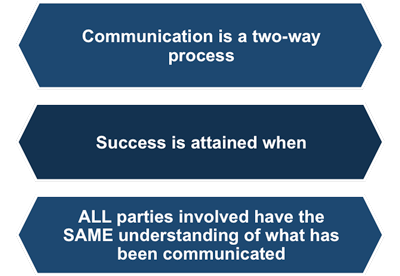 |
Communication is a complex two-way process that can involve several iterations before mutual understanding is achieved. Communication takes place in many ways. You can communicate using words, symbols, pictures, graphics, voice, tone, facial expressions, clothing, and body language.
Most communication is a combination of these elements. By understanding how to use these elements effectively you can improve the way you communicate and achieve the best outcome for any situation. Whether speaking formally or informally, addressing a meeting, or writing a report, the basic principles of communication are as follows.
Know your audience
Communication should always be packaged to suit the listener's level of understanding.
Know your purpose and topic
Make it clear whether you are delivering specific information, requesting information, or being social. Be aware of all the facts and details.
Anticipate objections and present a complete picture
Objections often arise due to misunderstandings. Communicate the benefits for both parties. Support your statements with evidence (e.g. statistics or testimonials).
Communicate a little at a time, then check the listener understands
Pause, ask questions, and give the listener an opportunity to ask questions.
Present information in several ways
What worked for one listener/reader may not work for another.
Develop practical, useful ways to get feedback
Feedback is the best way to evaluate the effectiveness of your communication.
In all areas of your life you will play many different roles in the communications process. At the highest level within this process you will either be the person instigating the exchange or the recipient of it.
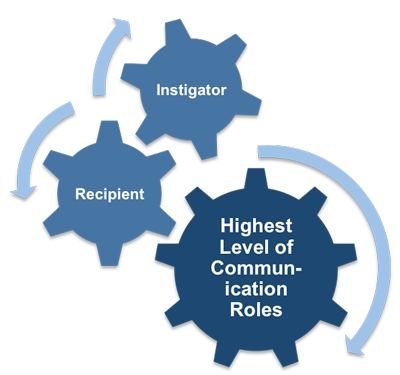 |
Whichever one of these roles you play you will have a variety of options that will shape your communications and the level of preparation you are able to perform.
Those who instigate a communication will generally be performing one the following roles that will match the reason why the communication is taking place.
Communicator - you have a need to inform an individual about some aspect of their work or you require them to take on a task you need to delegate. You might need to persuade someone or a group to accept the topic of your communication and its implications or repercussions. The communication may, or may not, have been expected and you will be able to establish this by listening and observing the recipients' responses.
Investigator - the reason for your communication is to find out some information or data that you need to make a decision. It can also be that you need to find out the latest status of a project or task.
Assessor - you have to assess how well someone, or a group, is performing their role or task. In this role you may be responsible for gathering and collating the data you collect as part of this communication process.
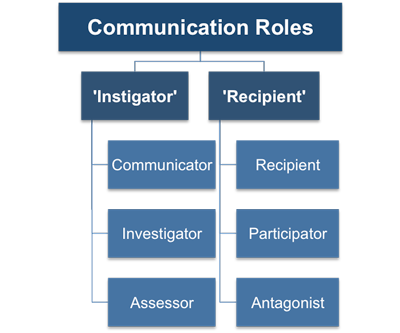 |
If you are the individual receiving the communication then the role you will adopt during the exchange will fall into three broad categories:
Recipient - you need the information or data contained in the communication to ensure that you can complete your task or perform your job. Much of the communication in this role is of a general nature and its purpose it to keep you informed of organizational changes and progress.
Participator - this is the role you will often find yourself in. Your knowledge and skills are required in a discussion or decision-making process that has mutual benefit to those involved in the communication.
Antagonist - your viewpoint may be contrary to that of other person or people in the exchange and you want to ensure that those involved in the communication are fully informed of all issues in order to ensure that a well-reasoned decision or judgment is the end result.
With each of these broad roles you will alter your behaviors and method of communicating to suit the environment and circumstance. But whichever high-level role you find yourself performing you will also need to actively listen to the whole of the two-way exchange.
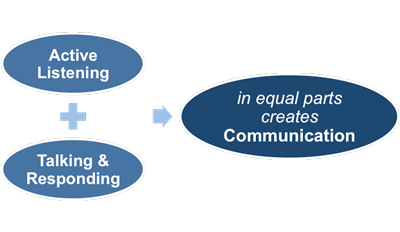 |
An important skill that all good communicators possess is their ability to actively listen. Developing the skill of actively listening during conversations enables you to avoid misunderstandings, confusion, and misinterpretations. It also ensures that you are always looking at the 'big picture' when communicating.
Active listening is explained in detail in the eBook 'Active Listening' which you can download free from this website.
You may also be interested in:
Workplace Communication Styles | Recognizing Workplace Communication Styles | Perceptual Preferences | Attitudes to Communications | Communication Research | Using the RESULT Principle | Barriers to Communication.


